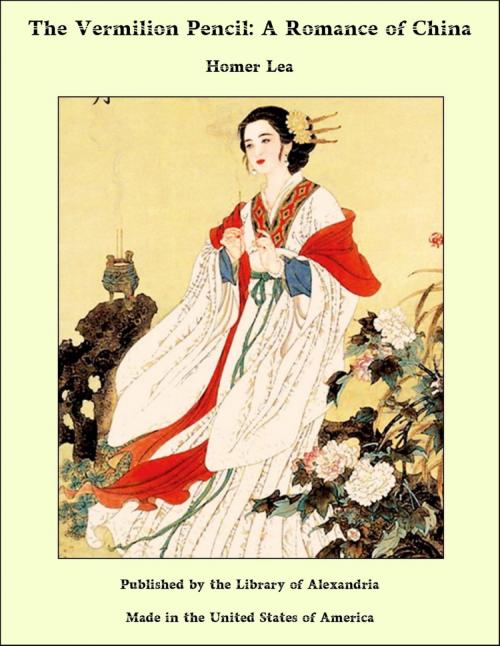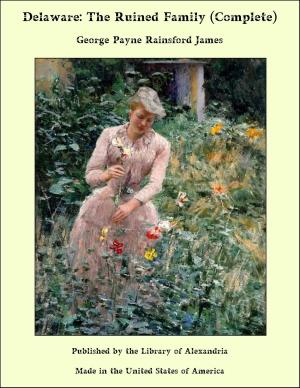The Vermilion Pencil: A Romance of China
Nonfiction, Religion & Spirituality, New Age, History, Fiction & Literature| Author: | Homer Lea | ISBN: | 9781465616173 |
| Publisher: | Library of Alexandria | Publication: | March 8, 2015 |
| Imprint: | Language: | English |
| Author: | Homer Lea |
| ISBN: | 9781465616173 |
| Publisher: | Library of Alexandria |
| Publication: | March 8, 2015 |
| Imprint: | |
| Language: | English |
Just south of where the Yangtse River empties into the ocean lies the Province of the Winding Stream—venerable and beautiful, with a history written back almost to that long hour when the world was yet supposed to be unmade by the hand of God—a nebulous vapour adrift in the night. This province is one vast park of alternating hills and valleys, where peaks, cascades, and woodlands intervene in a fascinating confusion; where walled cities and temples rise majestically on all sides; where canals and watercourses, alive with boats, form a silvery network among fragrant hills and tree-hid hamlets, making it altogether just such a land as the imagination conceives belonging alone to the sunlit East. This province is like an endless garden; whereever the eye reaches is seen not only a luxuriant vegetation but one that has been tended and reared by man for his uses. Patches of pink orchard blossoms alternate with grey thickets of mulberry; clumps of feathery bamboo flutter as plumes by the edges of rice fields; plane trees with their snowy blossoms alternate with orchards of pumelo, while along the lower hills, forming wide and densely shaded tracts, spread groves of silvery olive and lichee with delicate pink leaves and strawberry-like fruit. Throughout all of these hills and orchards wind rivers, brooks, and canals, over-spanned at short intervals by high curved bridges of stone. Under their arches innumerable boats glide from dawn until night. In some places the country is covered with tea plantations, and from each willow-whipped cottage rises the fragrant breath of burning tea. Here and there on hills thick with cypress and pine are seen the carved gleaming roofs of temples, while on the paths leading to them every crag and turn has its miniature pagodas and grottoes. Again, the hills in many places are covered with groves of oil-bearing camelias, whose graceful shape and dark green foliage add an indescribable charm to the landscape. But Che Kiang is not more famous for the charm of its countryside than it is for the beauty of the women, who dwell among its hills and valleys, working in the midst of their tea shrubs, rearing cocoons, spinning silk; and are no more thought of than the azaleas that brighten the hillsides or the purple lanwhui that scatters its perfume on the bosom of the careless passing winds. In the Tien Mu Mountains, toward the southwestern part of the province, these women have a peculiar hauteur and independence of their own, a vivacity and laughter, which is found nowhere else in China. It was among these mountains and forests of the Tien Mu Shan that that tireless spider, Fate, set to weaving one of its innumerable webs of invisible strands: a net fragile yet terrible. Unseen or half seen, a spirit-glint in the azure heavens, it is a barrier through which and from which the little man-fly never breaks.
Just south of where the Yangtse River empties into the ocean lies the Province of the Winding Stream—venerable and beautiful, with a history written back almost to that long hour when the world was yet supposed to be unmade by the hand of God—a nebulous vapour adrift in the night. This province is one vast park of alternating hills and valleys, where peaks, cascades, and woodlands intervene in a fascinating confusion; where walled cities and temples rise majestically on all sides; where canals and watercourses, alive with boats, form a silvery network among fragrant hills and tree-hid hamlets, making it altogether just such a land as the imagination conceives belonging alone to the sunlit East. This province is like an endless garden; whereever the eye reaches is seen not only a luxuriant vegetation but one that has been tended and reared by man for his uses. Patches of pink orchard blossoms alternate with grey thickets of mulberry; clumps of feathery bamboo flutter as plumes by the edges of rice fields; plane trees with their snowy blossoms alternate with orchards of pumelo, while along the lower hills, forming wide and densely shaded tracts, spread groves of silvery olive and lichee with delicate pink leaves and strawberry-like fruit. Throughout all of these hills and orchards wind rivers, brooks, and canals, over-spanned at short intervals by high curved bridges of stone. Under their arches innumerable boats glide from dawn until night. In some places the country is covered with tea plantations, and from each willow-whipped cottage rises the fragrant breath of burning tea. Here and there on hills thick with cypress and pine are seen the carved gleaming roofs of temples, while on the paths leading to them every crag and turn has its miniature pagodas and grottoes. Again, the hills in many places are covered with groves of oil-bearing camelias, whose graceful shape and dark green foliage add an indescribable charm to the landscape. But Che Kiang is not more famous for the charm of its countryside than it is for the beauty of the women, who dwell among its hills and valleys, working in the midst of their tea shrubs, rearing cocoons, spinning silk; and are no more thought of than the azaleas that brighten the hillsides or the purple lanwhui that scatters its perfume on the bosom of the careless passing winds. In the Tien Mu Mountains, toward the southwestern part of the province, these women have a peculiar hauteur and independence of their own, a vivacity and laughter, which is found nowhere else in China. It was among these mountains and forests of the Tien Mu Shan that that tireless spider, Fate, set to weaving one of its innumerable webs of invisible strands: a net fragile yet terrible. Unseen or half seen, a spirit-glint in the azure heavens, it is a barrier through which and from which the little man-fly never breaks.















